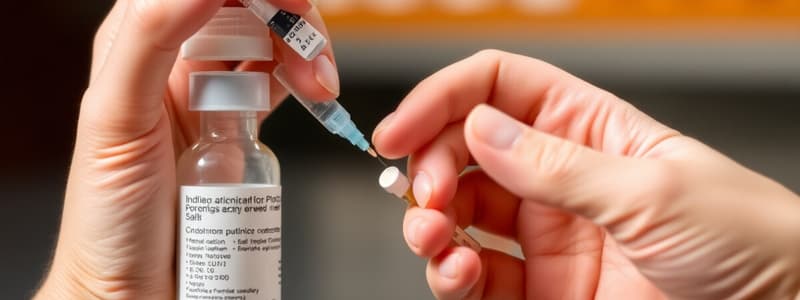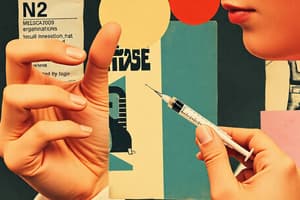Podcast
Questions and Answers
What is the purpose of injecting air into both a single-dose vial and a multidose vial before drawing medication?
What is the purpose of injecting air into both a single-dose vial and a multidose vial before drawing medication?
- To create a vacuum for easier drawing of medication
- To ensure accurate dosing from the multidose vial
- To prevent contamination of the multidose vial (correct)
- To prevent contamination of the single-dose vial
When preparing medications in one syringe, what must be ensured about the two drugs?
When preparing medications in one syringe, what must be ensured about the two drugs?
- They are in vials of the same type
- They are both single-dose vials
- They are compatible (correct)
- They have the same dosage
What happens to incompatible drugs when mixed in the same syringe?
What happens to incompatible drugs when mixed in the same syringe?
- They may become cloudy or form a precipitate (correct)
- They remain clear and homogeneous
- They multiply their onset time
- They enhance each other's effectiveness
Why is mixing more than two drugs in one syringe generally not recommended?
Why is mixing more than two drugs in one syringe generally not recommended?
Which of the following insulins cannot be mixed with others?
Which of the following insulins cannot be mixed with others?
What is the most commonly used scale for calculating insulin dosages?
What is the most commonly used scale for calculating insulin dosages?
What should you be aware of before administering insulin?
What should you be aware of before administering insulin?
What is a vital resource that should be available to nurses preparing medications?
What is a vital resource that should be available to nurses preparing medications?
Which personnel are allowed to prepare medication from two vials under specific conditions?
Which personnel are allowed to prepare medication from two vials under specific conditions?
When preparing insulin from two vials, which of the following assessments is critical?
When preparing insulin from two vials, which of the following assessments is critical?
What is an important visual assessment for insulin preparations that are typically unmodified?
What is an important visual assessment for insulin preparations that are typically unmodified?
What is the priority nursing diagnosis for a patient preparing for insulin administration?
What is the priority nursing diagnosis for a patient preparing for insulin administration?
Which step should be performed first when preparing to administer medication from two vials?
Which step should be performed first when preparing to administer medication from two vials?
What must be assessed before administering insulin to a patient?
What must be assessed before administering insulin to a patient?
Which of the following options could affect the appropriateness of drug administration?
Which of the following options could affect the appropriateness of drug administration?
What type of insulin preparations typically do not appear as clear substances?
What type of insulin preparations typically do not appear as clear substances?
What should be done to ensure the correct mixing of a suspension medication like NPH insulin?
What should be done to ensure the correct mixing of a suspension medication like NPH insulin?
Why is it important to allow the alcohol used to cleanse the rubber tops to dry?
Why is it important to allow the alcohol used to cleanse the rubber tops to dry?
What is the correct procedure when removing a cap from a needle?
What is the correct procedure when removing a cap from a needle?
Why is it necessary to draw back an equal amount of air into the syringe before withdrawing medication?
Why is it necessary to draw back an equal amount of air into the syringe before withdrawing medication?
How should the needle be inserted into a modified insulin vial?
How should the needle be inserted into a modified insulin vial?
What is a potential consequence of not mixing a suspension medication well before administration?
What is a potential consequence of not mixing a suspension medication well before administration?
What should not be done when injecting air into a modified insulin vial?
What should not be done when injecting air into a modified insulin vial?
What is the main goal of using an antimicrobial swab on the rubber tops of vials?
What is the main goal of using an antimicrobial swab on the rubber tops of vials?
What is the purpose of checking a medication order against the original order in the medical record?
What is the purpose of checking a medication order against the original order in the medical record?
Why is it necessary to know the safe dose ranges and adverse effects of medications?
Why is it necessary to know the safe dose ranges and adverse effects of medications?
What is the rationale for performing hand hygiene before medication administration?
What is the rationale for performing hand hygiene before medication administration?
Why should medications be prepared for one patient at a time?
Why should medications be prepared for one patient at a time?
What does the CMAR/MAR represent in the medication administration process?
What does the CMAR/MAR represent in the medication administration process?
Why is unlocking the medication cart important during medication administration?
Why is unlocking the medication cart important during medication administration?
What is the first step in verifying medications from stock before administration?
What is the first step in verifying medications from stock before administration?
What is a key reason for performing dosage calculations with a second nurse if necessary?
What is a key reason for performing dosage calculations with a second nurse if necessary?
Why is it important to check the first medication in the syringe before adding a second drug?
Why is it important to check the first medication in the syringe before adding a second drug?
What is the purpose of inverting the modified vial during the medication withdrawal process?
What is the purpose of inverting the modified vial during the medication withdrawal process?
What should be done after drawing up the prescribed amount of medication?
What should be done after drawing up the prescribed amount of medication?
What safety measure should be implemented to avoid needlesticks?
What safety measure should be implemented to avoid needlesticks?
What does the third check of the medication label ensure?
What does the third check of the medication label ensure?
What should be included on the labels of the vials after opening?
What should be included on the labels of the vials after opening?
Why is it crucial to hold the syringe at eye level during medication withdrawal?
Why is it crucial to hold the syringe at eye level during medication withdrawal?
What should be done if the correct amount of medication is not drawn up initially?
What should be done if the correct amount of medication is not drawn up initially?
Flashcards are hidden until you start studying
Study Notes
Medication Preparation: Single vs. Multidose Vials
- When preparing medication from a single-dose and a multidose vial, draw medication from the multidose vial first to prevent contamination.
- Cleanse the vial tops with an antimicrobial swab before each entry.
- Use a sterile needle and syringe for each entry into a multidose vial.
Mixing Medications
- Always ensure medications are compatible before mixing in a single syringe.
- Incompatibility may lead to cloudiness or precipitation, requiring discard and preparation in separate syringes.
- Some drugs have limited compatibility and should be administered within 15 minutes of preparation.
- Mixing more than two drugs in one syringe is generally not recommended. Consult a pharmacist to determine compatibility in such cases.
Insulin Administration
- Insulin is commonly combined in one syringe for injection.
- There are different types of insulin with varying onset and duration of action: rapid, short, intermediate, and long acting.
- Ensure proper food is available before administering insulin, considering peak and duration of effects.
- Not all insulins are compatible (e.g., Lantus and Levemir). Refer to drug references for specific interactions.
- Insulin dosages are calculated in units. The U100 scale, based on 100 units per 1 mL of solution, is commonly used.
Delegation Considerations
- Preparing medication from two vials is not delegated to nursing assistive personnel (NAP) or unlicensed assistive personnel (UAP).
- Delegation to licensed practical/vocational nurses (LPN/LVNs) may vary depending on state nurse practice acts and organizational policies.
- Assess the patient's needs, circumstances, and the qualifications of the delegatee before delegating.
Essential Equipment
- Two vials of the medication (insulin in this example)
- Sterile syringe (insulin syringe in this example)
- Antimicrobial swabs
- Computer-generated Medication Administration Record (CMAR) or Medication Administration Record (MAR)
Nursing Assessment
- Verify medication compatibility. Not all insulins can be mixed together.
- Assess the vial contents. Unmodified insulin appears clear and should be free of particles. Modified insulin is typically a suspension.
- Check for expiration dates.
- Assess the appropriateness of the medication for the patient and review relevant data.
- Verify patient name, dose, route, and time of administration.
Nursing Diagnoses
- Risk for Infection
- Deficient Knowledge
- Risk for Injury
Outcome Identification and Planning
- Ensure sterile withdrawal of medication into the syringe.
- Accurate preparation of the prescribed dose.
Implementation Actions
- Gather equipment, comparing the medication order with the original order.
- Know the medication's actions, nursing considerations, safe dose ranges, purpose of administration, and adverse effects.
- Perform hand hygiene.
- Prepare medications for one patient at a time.
- Read and select medications from the CMAR/MAR.
- Compare labels with the CMAR/MAR, checking expiration dates and performing dosage calculations.
- Cleanse rubber tops with antimicrobial swabs, allowing them to dry.
- Remove the needle cap by pulling straight off, touching only the plunger knob.
- Inject an amount of air into the syringe equal to the dose of medication.
- Hold the modified insulin vial on a flat surface. Pierce the rubber stopper with the needle and inject air above the solution.
- Withdraw the prescribed amount of medication, ensuring accuracy, while holding the syringe at eye level.
- Recap the needle using the one-handed method.
- Check the amount of medication in the syringe against the prescribed dose.
- Perform a third label check prior to administration, according to facility policy.
- Label vials with the opening date and time, storing remaining medication for future use.
Studying That Suits You
Use AI to generate personalized quizzes and flashcards to suit your learning preferences.




